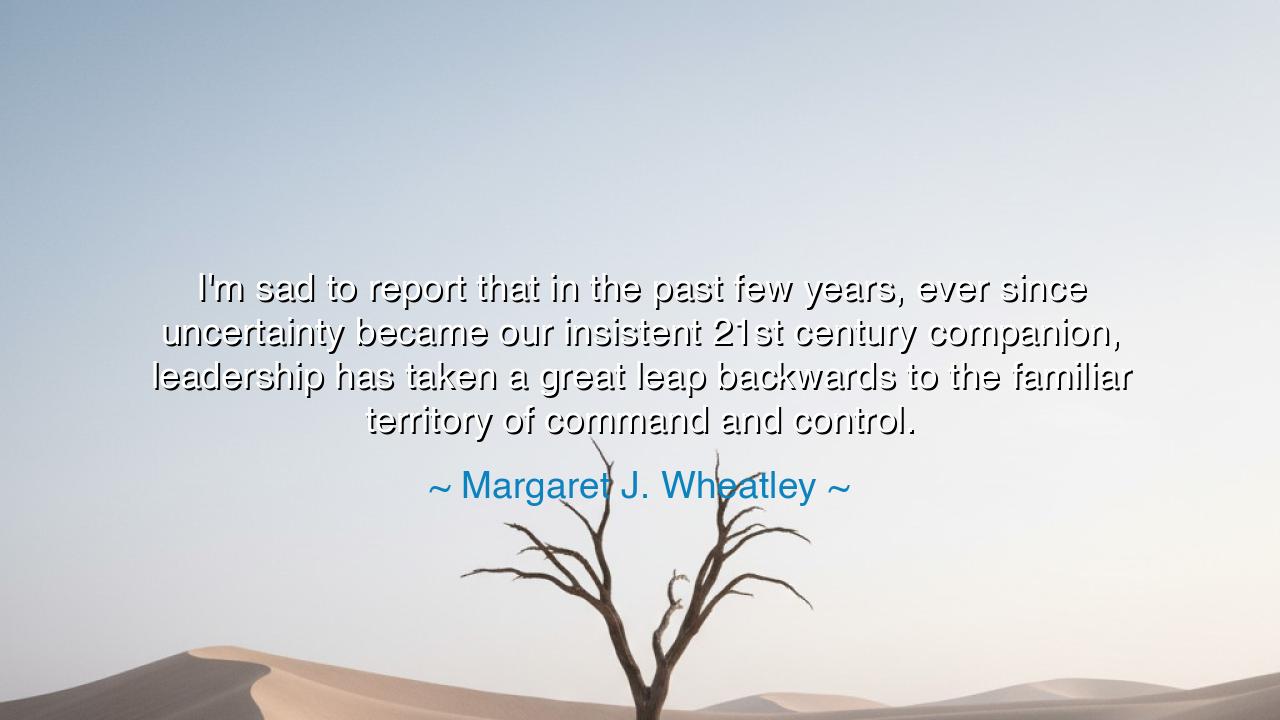
I'm sad to report that in the past few years, ever since
I'm sad to report that in the past few years, ever since uncertainty became our insistent 21st century companion, leadership has taken a great leap backwards to the familiar territory of command and control.






The words of Margaret J. Wheatley — “I’m sad to report that in the past few years, ever since uncertainty became our insistent 21st century companion, leadership has taken a great leap backwards to the familiar territory of command and control” — resound as both lament and warning. In them we hear the voice of a thinker who has walked among leaders, studied the tides of human organization, and watched the heart of leadership wither beneath the shadow of fear. Wheatley, a scholar of systems and a poet of human spirit, reminds us that the true essence of leadership is not domination, but relationship — not the tightening of authority in times of uncertainty, but the expansion of trust. Her words are a mirror held up to our age, reflecting how quickly humanity retreats to old instincts when the world trembles.
At the root of her reflection lies a timeless truth: fear breeds control. When faced with chaos — whether in nations, institutions, or families — people often reach for the illusion of certainty. Leaders, rather than listening, command; rather than empowering, they restrain. This is the “leap backwards” Wheatley mourns — a return to the ancient hierarchies of power where obedience replaces creativity and authority suffocates wisdom. The ancients, too, knew this danger. When Pharaoh feared the growth of the Israelites, he enslaved them; when emperors feared rebellion, they silenced their people. Yet history has always proven that the rule of control is brittle, while the reign of trust endures. True leadership, Wheatley teaches, is not the assertion of dominance but the cultivation of courage in others.
The 21st century has indeed been marked by uncertainty — wars, pandemics, climate upheavals, economic collapse, and the blurring of truth in the digital age. In such times, the human spirit longs for order, for someone to promise safety. But Wheatley sees through the surface: she knows that control is a refuge for the fearful, not the wise. It is easy to lead when the path is straight and the road clear; but when storms rage and horizons vanish, only the leaders who trust their people can sustain the journey. For the old ways of command may produce obedience, but never resilience. The uncertain world demands leaders who are not generals barking orders, but gardeners tending growth, who create conditions where life adapts, learns, and thrives in complexity.
History offers a striking example in the story of Ernest Shackleton, the Antarctic explorer. When his ship, the Endurance, was trapped and crushed in the polar ice, Shackleton faced absolute uncertainty — months of isolation, hunger, and despair. Yet he did not command through fear or rigid discipline. He led through presence, humor, compassion, and faith. He listened as much as he spoke, and he inspired through example. Against all odds, not one man was lost. Shackleton’s story shines as the embodiment of Wheatley’s wisdom: when uncertainty reigns, the leader’s task is not to control the storm, but to steady the hearts of those within it.
Wheatley’s sorrow is not nostalgia for the past, but concern for the future of leadership itself. In a world more connected than ever, true power no longer resides in hierarchy but in collaboration. Yet too often, institutions still cling to the architecture of control — layers of authority, rigid systems, the silencing of dissent. This suffocates innovation and breeds alienation. The ancient philosophers warned of this very fate. Lao Tzu, in the Tao Te Ching, wrote: “A leader is best when people barely know he exists; when his work is done, they will say, ‘we did it ourselves.’” This is the leadership Wheatley defends — humble, relational, born of trust rather than command.
In the world of business, governance, and even education, we see her words fulfilled. When leaders act from fear, they create walls; when they act from faith in the human spirit, they build bridges. The path forward, she teaches, requires a return to the ancient virtues of courage, patience, and listening. Leadership is not a performance of authority, but a practice of service. In uncertainty, the leader’s greatest power lies not in control, but in the ability to kindle hope — to remind others that chaos is not the end of order, but the birthplace of new beginnings.
The lesson of Wheatley’s quote, then, is profound: the measure of a leader is not found in their ability to command, but in their capacity to create space for others to lead. The wise leader does not cling to control when uncertainty arises; instead, they awaken the strength of those around them. For in every age, the most enduring leadership flows from love, not fear — from humility, not pride.
Therefore, let all who lead — parents, teachers, managers, rulers — remember these words as a guiding star: when the world shakes, do not grip harder, but open wider. Trust your people. Listen deeply. Lead not with orders, but with example. For when command and control fade away, what remains is the essence of all true leadership — the courage to serve, and the faith to believe that within the human heart lies the power to rise, even in the darkest of times.






AAdministratorAdministrator
Welcome, honored guests. Please leave a comment, we will respond soon